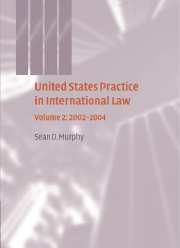Book contents
- Frontmatter
- Contents
- Foreword by Judge Stephen M. Schwebel
- Acknowledgments
- Table of Periodical Abbreviations
- Table of Cases
- Table of U.S. Statutes
- Table of Treaties
- I General International and U.S. Foreign Relations Law
- II State Diplomatic and Consular Relations
- III State Jurisdiction and Immunities
- IV State Responsibility and Liability
- V International Organizations
- VI International Oceans, Environment, Health, and Aviation Law
- VII International Economic Law
- VIII International Human Rights
- IX International Criminal Law
- X Use of Force and Arms Control
- XI Settlement of Disputes
- XII Private International Law
- Annex
- Index
IV - State Responsibility and Liability
Published online by Cambridge University Press: 10 December 2009
- Frontmatter
- Contents
- Foreword by Judge Stephen M. Schwebel
- Acknowledgments
- Table of Periodical Abbreviations
- Table of Cases
- Table of U.S. Statutes
- Table of Treaties
- I General International and U.S. Foreign Relations Law
- II State Diplomatic and Consular Relations
- III State Jurisdiction and Immunities
- IV State Responsibility and Liability
- V International Organizations
- VI International Oceans, Environment, Health, and Aviation Law
- VII International Economic Law
- VIII International Human Rights
- IX International Criminal Law
- X Use of Force and Arms Control
- XI Settlement of Disputes
- XII Private International Law
- Annex
- Index
Summary
OVERVIEW
During the course of 2002–2004, various issues of state responsibility and liability arose in the context of claims by U.S. nationals against foreign governments, and foreign nationals against the U.S. government. A particularly fertile area for the development of international standards on the presentation of claims (such as rules on continuous nationality of a claim and on exhaustion of local remedies), and on expropriation, national treatment, and denial of justice, was the dispute settlement process under Chapter 11 of the North American Free Trade Agreement (NAFTA). In briefs filed before various NAFTA panels, the U.S. government explicated its positions on such standards, and the panels then reacted to those positions in their decisions. The positions taken by the United States, in turn, influenced the development of investment-related provisions in bilateral and multilateral trade agreements, as discussed infra Chapter VII. There were no bilateral “lump sum” settlement agreements concluded with foreign governments during this period, nor any high-profile payments of claims by the United States to foreign nationals. While all private claims had been concluded before the Iran-U.S. Claims Tribunal, the U.S. government remained actively engaged in the resolution of claims before the UN Compensation Commission concerning loss, damage or injury by Iraq during the 1990–1991 Iraq–Kuwait war. Compensation for injuries sustained during the Second World War also featured during this period.
- Type
- Chapter
- Information
- United States Practice in International Law , pp. 86 - 101Publisher: Cambridge University PressPrint publication year: 2006

